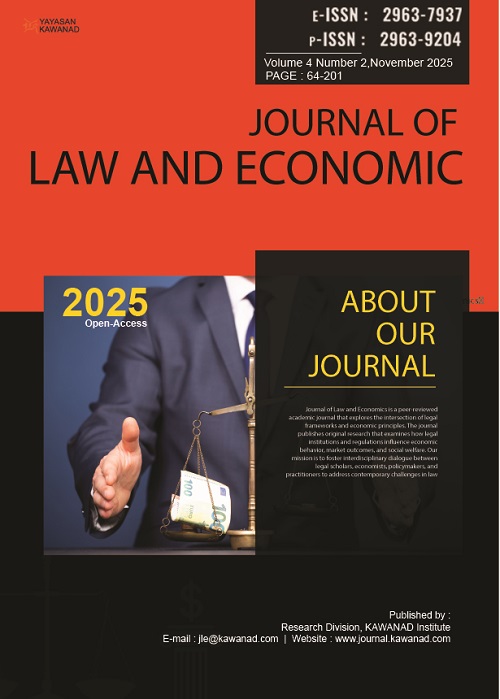TEMPLATE
- masriali@unsyiah.ac.id
- Banda Aceh City, Indonesia
- +6281360650791
Articles
- Home
- Archives
- Vol. 4 No. 2 (2025): NOVEMBER
- Articles
- Home
- Archives
- Vol. 4 No. 2 (2025): NOVEMBER
- Articles
Legal Safeguards for Government Criticism Expression on Social Media Platforms Under the 2016 Information and Electronic Transactions Law (Law No. 19/2016)
- Authors Amadeus Yves Bimoribowo , Rizka Amelia Azis
- Affiliations
- Published 2025-11-30
- Section Articles
- DOI https://doi.org/10.56347/jle.v4i2.324
- Issue Vol. 4 No. 2 (2025): NOVEMBER
0
Views
0
Downloads
Altmetrics
Abstract
Advances in information technology in the digital era have given rise to social media as a new means for people to voice their opinions, including criticizing the government. However, this freedom of expression often conflicts with legal aspects, particularly the provisions of Law Number 11 of 2008 concerning Electronic Information and Transactions (ITE), which was amended by Law Number 19 of 2016, specifically Article 27 paragraph (3) and Article 28 paragraph (2). This research aims to examine how these two articles are implemented in responding to criticism of the government conveyed through social media and the extent to which legal protection is provided to citizens. The focus of the research was directed toward the case of Bima Yudho Saputro, who was reported for criticizing conditions in his home region through TikTok. This research adopts a normative juridical method with an analytical approach to legal and case research. The findings suggest that these articles are often misinterpreted and risk criminalizing legally valid forms of criticism, despite not fulfilling the elements of a crime. Legal protection, both preventive and repressive, remains ineffective due to weak regulations, insufficient understanding among law enforcement officials, and limited public access to legal aid. Therefore, regulatory reform and institutional strengthening are needed to ensure that freedom of expression remains protected within a democratic, rule-of-law system.
Keywords
References
- Abdillah, B., Tanlain, E. C., Dewi, K. N., Cahasta, L. A., Amelia, R., Wardanti, U. P., Asmini, Y., & Rahayu, S. (2021). Manual pelatihan hak atas kebebasan berpendapat dan berekspresi. Komisi Nasional Hak Asasi Manusia (Komnas HAM). https://www.komnasham.go.id/files/20220307-manual-pelatihan-hak-atas-kebebasan-$Z3NYU.pdf
- Adhigama, A. B., Maya, G. A. K. S., Rahmawati, M., & Abidin, Z. (2021). Mengatur ulang kebijakan pidana di ruang siber: Studi tentang penerapan UU ITE di Indonesia. Institute for Criminal Justice Reform (ICJR).
- Asfar, A. M. (2024). Panduan advokasi jurnalis dari jerat UU ITE dan KUHP. Aliansi Jurnalis Independen (AJI) Indonesia. www.aji.or.id
- Bukit, A. N., & Ayunda, R. (2022). Urgensi pengesahan RUU perlindungan data pribadi terhadap perlindungan kebocoran data penerimaan SMS dana cepat. Reformasi Hukum, 26(1), 1–20. https://doi.org/10.46257/jrh.v26i1.376
- Bychawska-Siniarska, D. (2017). Protecting the right to freedom of expression under the European Convention on Human Rights. Council of Europe. http://www.coe.int/en/web/help/help-training-platform
- Cahyo, A. D., Fitriyantica, A., & Hermawan, M. B. (2023). ANALISIS PENCEMARAN NAMA BAIK GUBERNUR LAMPUNG OLEH TIKTOKER BIMA (Kajian Pasal 28 Ayat 2 Juncto Pasal 45 A ayat 2 UU ITE Tentang Ujaran Kebencian Yang Mengandung Unsur SARA). Journal Evidence Of Law, 2(2), 219-231. https://doi.org/10.59066/jel.v2i2.461
- Dewi, V. D. P. (2024). KEBEBASAN BERPENDAPAT DAN PELANGGARAN HAK ASASI MANUSIA DI MEDIA SOSIAL. Legal Studies Journal, 4(1), 82-92. https://doi.org/10.33650/lsj.v4i1.10861
- Fidela, H. C., Abdurrohman, H., & Irsyad, M. R. (2024). Studi Kasus Tiktoker Bima Yudho Saputro terkait Kritik terhadap Pemerintah Lampung Ditinjau dari Sudut Pandang Demokrasi dan TIK. Jurnal Ilmiah Wahana Pendidikan, 10(14), 622-628. https://doi.org/10.5281/zenodo.13732121
- Fitriani, N. I., Ahmad, R. A. F., Nazalla, R., & Wibowo, T. S. A. (2025). Kebebasan Berpendapat di Era Media Sosial: Tantangan dan Solusi Hak Asasi Manusia. Jurnal Pemikiran Pengembangan Ilmu Pengetahuan, 1(1), 1-6.
- Guntara, B., & Herry, A. S. (2022). Hak kebebasan berpendapat di media sosial dalam perspektif hak asasi manusia. Jurnal Pendidikan dan Konseling, 4(6), 6945–6961.
- Harahap, S. B., & Hidayat, R. (2023). Tinjauan Hukum Tentang Kebebasan Berpendapat Dari Aspek Hukum Positif Dan Hukum Islam (Studi Kasus Bima Lampung). Unes Law Review, 6(2), 5468-5478. https://doi.org/10.31933/unesrev.v6i2
- Mahkamah Agung Republik Indonesia. (2024). Putusan Nomor 6459 K/Pid.Sus/2024. https://putusan3.mahkamahagung.go.id/
- Mahkamah Konstitusi Republik Indonesia. (2008). Putusan Mahkamah Konstitusi Nomor 50/PUU-VI/2008. https://putusan.mkri.id/
- Patra, R., Maharani, C., Aldi, A., Alkadrie, B. N., Alkadrie, Z. Y. M., & Qanuni, U. (2024). Sosialisasi hak kebebasan berpendapat dan berekspresi yang bertanggung jawab di media sosial bagi generasi muda di Pontianak. Jurnal Pengabdian Kepada Masyarakat Nusantara, 5(1), 1108–1114. https://doi.org/10.55338/jpkmn.v5i1.2909
- Pengadilan Negeri Jepara. (2024). Putusan Pengadilan Negeri Jepara Nomor 14/Pid.Sus/2024/PN Jpa.
- Pengadilan Tinggi Semarang. (2024). Putusan Nomor 374/Pid.Sus/2024/PT SMG. https://putusan3.mahkamahagung.go.id/
- Pratama, M. I., Rahman, A., & Bachmid, F. (2022). Kebebasan berpendapat dan berekspresi di media sosial dalam perspektif hak asasi manusia. Qawanin Jurnal Ilmu Hukum, 3(1), 1-16. https://doi.org/10.56087/qawaninjih.v3i1.406.
- Redaksi Kompas. (2023, April 18). Kasus Bima dan dinamika kebebasan berpendapat di media sosial. Kompas.Id.
- Sethiawanza, A. (2024). Peran Hukum Dalam Menjaga Kebebasan Berpendapat Di Media Sosial: Antara Hak Dan Kewajiban. Jurnal Kajian Hukum Dan Kebijakan Publik| E-ISSN: 3031-8882, 2(1), 632-638. https://doi.org/10.62379/4cewwz38
- Situmeang, S. M. (2020). Cyber law. CV. Cakra.
- Syamsidar, S., Muhammad Reza, Z., Eka Ari, E., & Retno Sari, D. (2023). Tantangan dalam Menjaga Kebebasan Berpendapat di Era Digital. PT Literasi Nusantara Abadi Grup.
- Tabrozi, D. (2025). Jaminan Kebebasan Berpendapat dalam Negara Hukum Modern: Studi Atas Pembubaran Diskusi Diaspora di Jakarta Selatan. IN RIGHT: Jurnal Agama dan Hak Azazi Manusia, 14(1), 1-27. https://doi.org/10.14421/inright.v14i1.4040
Author Biographies


Similar Articles
Discover other articles with topics similar to what you're currently reading. Find more references and expand your knowledge base.

More Similar Articles
Legal Analysis of Post-Divorce Child Protection Rights...
Devani Elisabeth Situngkir, Nurbaiti Nurbaiti
Vol. 4 No. 2 (2025): NOVEMBERJuridical Review of Judicial Considerations in Deciding...
Stella Maris Diaz, Debi F.Ng. Fallo, Ngongo Dede
Vol. 4 No. 1 (2025): MAYDampak Undang-Undang Nomor 4 Tahun 2023 tentang...
Muhammad Takhsin, Putri Latiffa Azzahra
Vol. 2 No. 1 (2023): MAY 2023Juridical Review of Human Trafficking as a Transnational...
Rini T Simangunsong , Dina M Situmeang
Vol. 4 No. 1 (2025): MAY













